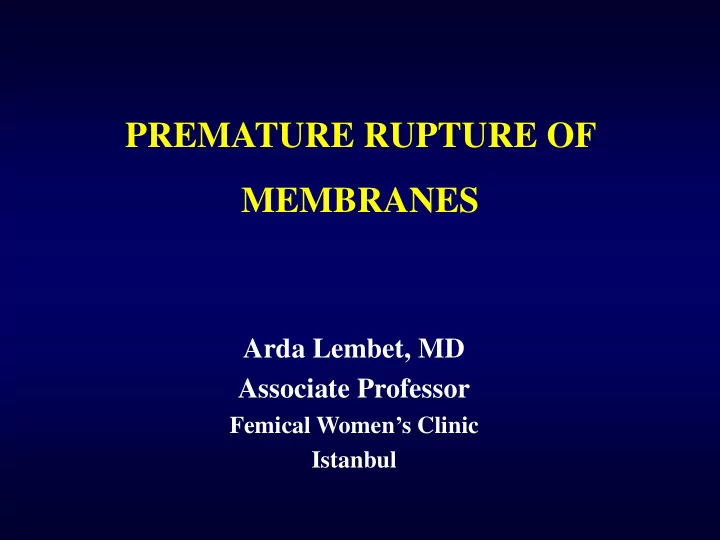

PREMATURE RUPTURE OF MEMBRANES Arda Lembet, MD Associate Professor Femical Women ’ s Clinic Istanbul
PROM Overview, clinical significance Diagnosis Evaluation Management > 37 weeks 34 - 36 6/7 weeks 32 - 33 6/7 weeks 23 - 31 6/7 weeks < 23 weeks
PPROM Management - Special Circumstances Cerclage HSV ,HIV Membrane resealing Amnioinfusion, amniopatch Prevention of recurrent PPROM Multiple pregnancy Hospital versus outpatient management
PROM: Premature rupture of membranes PPROM: Preterm premature rupture of membranes LATENCY: Interval from rupture of membranes to onset of active labor
PPROM Overview, clinical significance Clinical chorioamnionitis % 13-60 Endometritis % 2-13 (+) AF culture % 25-35 Maternal sepsis % 1 Fetal loss % 1-2 Abruptio placenta % 4-12
PPROM Pathophysiology: Collagen remodeling, cellular apoptozis Ascending infection Clinical risk factors : Short cervix / incompetent cervix Cervicovaginal fetal fibronectin Abruption Polyhydramnios / multiple gestation
(PROM ) Clinical Risk Factors Odds ratio H /o PPROM 3.3-6.3 H / o PTL 1.9-2.8 Smoking 2.1 Vaginal bleeding during pregnancy 1.trimester 2.4 2. trimester 4.4 3. trimester 6.4 > 1 trimester 7.4 Acute pulmonary disease 1.8 Bacterial vaginosis 1.5
PROM Diagnosis Clinical Diagnosis: Tests : Alkaline pH > 6- 6.5 Ferning Biochemical markers: (placental alpha microglobulin-1 (PAMG-1) IGFBP-1, fFN, AFP, fT4, prolactin, hCG, IL-6 ) USG: AFV ?, AS ?
PPROM Evaluation- I Cultures: Cervical cultures; Neisseria gonorrhea, Chlamydia, anovaginal culture; GBS Urinalysis / culture Digital exam: NO NST: For how long?, intermittent monitoring Clinical chorioamnionitis: Fever > 38 , uterine tenderness and / or maternal and fetal tachycardia…..Delivery
PPROM Evaluation - II Leucocytosis: WBC > 16,000 USG / Fetal Biophysical Profile Amniocentesis: Gram stain, WBC >30 cell/microl, glucose < 16-20, culture (aerobic-anaerobic, mycoplazma )
PPROM Evaluation - II Amniotic Fluid Culture: • Group B Streptococcus 20 % • Gardnerella vaginalis 17 % • Peptostreptococcus 11 % • Fusobacteria 10% • Bacteroides fragilis 9 % • Other streptococci 9 % • Bacteroides sp. 5 %
PPROM Evaluation - III CERVICAL LENGTH Cut-off level: 2-2.4 cm Latency period Intraamniotic infection How does it compare to WBC, CRP ??
PPROM Evaluation - IV Fetal Lung Maturity Evaluation in Vaginal Pool L/S Ratio Not Reliable TDX: FLM Assay Not Validated PG Useful
PPROM Evaluation - V
PPROM Management Clinical chorioamnionitis Nonreassuring fetal well being, Severe vaginal bleeding, Advanced labor, Pregnancy complications ( preeclampsia etc ) DELIVERY
PROM Management Term > 37 weeks : Infection : 12 h %2 12-24 %6 48 %24 Labor induction / augmentation: Prostaglandin: GBS: > 18 h prophylaxis, culture last 6 week > -
PPROM Management Preterm: 34 - 36 6/7 weeks : Corticosteroids ? Prolongation of latent phase ? Since the risk of infection and umbilical cord accidents are higher than the risk of prematurity …. DELIVERY
PPROM Management 34-37 weeks
Chorioamnionitis should we care ?
Chorioamnionitis should we care ?
PPROM Management Preterm: 32 - 33 6/7 weeks : Lung maturation : Vaginal pooling / AS PG, FLM or L/S if mature…DELIVERY Immature or can not be tested Delivery after steroids (24-48 hours later or deliver @34 weeks ) / Broad spectrum antibiotics
PPROM Management Preterm: 23 - 31 6/7 weeks: Fetal / maternal monitorization Antenatal corticosteroids : Broad spectrum antibiotics: Amp 2 g iv / q 6 h 48 h + eritro iv 250 mg q 6 Amoxocilin 250 mg po q 8 5 d + eritro 333 po q 6 Alternative; oral amp / eritro / azithro
PPROM Management Preterm: 23 - 31 6/7 weeks : The relation between broad spectrum ab and NEC ?? After 7 days of ab f/u patients for GBS carriers Stop ab, treat intrapartum After 7 days give narrow spectrum ab until delivery Follow by anovaginal cultures ; Treat if +
PPROM Management Preterm: 23 - 31 6/7 weeks : Consider Mg SO4 for neuroprotection if delivery < 32 weeks
PPROM Management Preterm: 23 - 31 6/7 weeks : Daily NST / FBPP WBC ?? Baseline Cervicovaginal pathogen and UTI treatment USG, oligohydroamnios ?? Tocolysis, amnioinfusion Thromboemboli prophylaxis
PPROM Management Preterm: < 23 weeks : Dating and confirmation of the gestational week High complication rate: Chorioamnionitis % 39 Endometritis % 14 Abruption % 3 Placenta ret, PPH, D&C % 12 IUFD (fetal demise) % 15
PPROM Management Preterm: < 23 weeks : Oligohydramnios: < 20 weeks: Poor prognostic parameter Pulmonary hypoplasia ( TC / AC ) Skeletal deformities Membrane resealing: New treatment modalities: Gelfoam,fibrin-platelet-cryo-
NICHD Extremely Preterm Birth Outcome Data
NICHD Extremely Preterm Birth Outcome Data
PPROM Management - Special Circumstances Cerclage: Should it be removed ? When ? HSV: HIV: Membrane resealing: Amnioinfusion: Prevention of recurrent PPROM: Progesterone , Vitamin C , E? Multiple pregnancy:
PPROM Management - Special Circumstances Multiple pregnancy: Incidence: 7-8 % Latency period Survival , morbidity, sac differs ?? Antibiotics, steroids : Same as singletons Tocolysis, MgSO4: Same as singletons Delayed interval delivery ?? Selective fetocide ??
Recommend
More recommend